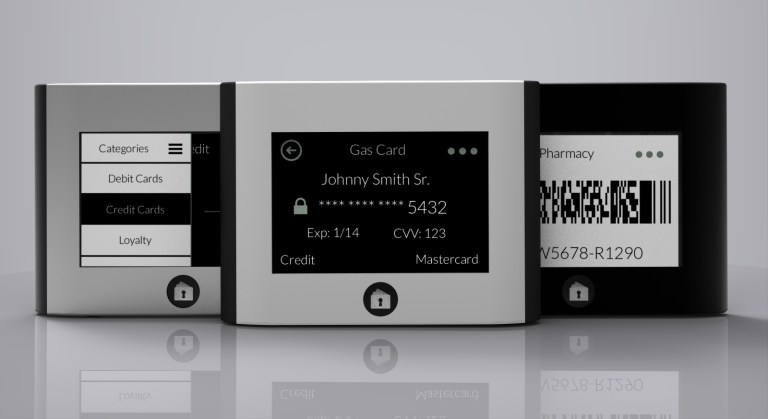Will hype alone be able to carry the mobile-payments market? A Shelton, Conn.-based company apparently believes so. It also believes the phone is unnecessary to bring “mobile” eWallet payments to the masses.
NXT-ID, a biometrics-authentication company, on April 1 announced the first corporate launch and press conference of its “next generation” smart wallet, Wocket – a full two months ahead of the actual marketing event, which take place May 28 in New York.
Use of the wallet, which operates separately from a smartphone, uses dynamic pairing, a patent-pending method where two devices dynamically generate pseudorandom pairing codes recognized by other devices. Users swipe their cards directly into the wallet during the initial set-up process. Barcodes and text may be scanned or entered into the wallet as well.
The information is then encrypted by the owner’s biometric stamp and can be accessed via a low-power touch screen or, optionally, a voice command, the company says on its website. A voicematch algorithm authenticates the voice, selects the card and sends the information to a single, dynamically programmable card included with the wallet.
Once programmed, users may swipe that dynamic card anywhere payment cards are accepted. The wallet also supports barcode-based payments and authenticated transfers via Bluetooth; eventual NFC-and acoustic-method support also is planned, the company says. As such, it does not appear to require merchants to make any changes to their systems, but the company doesn’t come right out and say that.
Advertisement: Scroll to Continue
The company has not yet said how much Wockets will cost, though it says pre-orders will be taken after the May 28 event. The standard Wocket will be 3.7 inches wide by 2.75 inches long by 0.39 inches high.
The folks behind the venture know a thing or two about what’s necessary to drive product interest, though convincing consumers to swap out their leather wallets for an electronic version will be no easy task, not to mention getting them to carry another electronic device. Heading up the marketing of the Wocket wallet is Lawrence Flanagan, former chief marketing office at MasterCard, where he helped launch the card network’s “Priceless” advertising campaign.
Security appears to be one of the main points Wocket’s backers are trying to push in promoting the product. And that’s a good thing. A recent Federal Reserve Board of Governors study pointed out one of the main issues preventing consumers from using mobile wallets for banking and payments is security. However, the initial launch focuses on protecting wallet contents, though NXT-ID says it will support encryption to protect data shared with merchants when its card is swiped in their terminals.
“There is growing demand and consumer interest for a product like this that protects privacy and prevents identity theft, and there are a number of features that makes Wocket stand out from the crowd,” Gino Pereira, NXT-ID CEO, said in the April 1 announcement. “Wocket is biometrically secure, so only you can access it with your own unique combination of voice, PIN or pattern; each time your card is used the information on your card is zeroed, so it is useless to someone else who tries to use it or steal it.”
Wocket can store up more than 10,000 loyalty, gift or virtually any other type of cards, and it operates separately from a smartphone, Pereira said. “So if your phone is stolen, lost or runs out of battery, you can still use Wocket, with its full functionality, just as you would your wallet,” he said.
Pereira went on to note that Wocket represents just the beginning of the company’s MobileBio suite of products that includes technologies for data encryption to further reduce credit card fraud. Future versions of Wocket will include a wider range of communication technologies, such as 4G and NFC, protected by the firm’s proprietary encryption technologies, he said.

